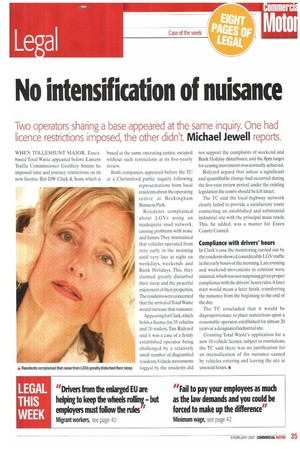No intensification of nuisance
Page 35

If you've noticed an error in this article please click here to report it so we can fix it.
Two operators sharing a base appeared at the same inquiry. One had licence restrictions imposed, the other didn't. Michael Jewell reports.
WHEN TOLLESHUNT MAJOR, Essexbased Total Waste appeared before Eastern Traffic Commissioner Geoffrey Simms he imposed time and journey restrictions on its new licence. But DW Clark & Sons, which is based at the same operating centre, escaped without such restrictions at its five-yearly review.
Both companies appeared before the TC at a Chelmsford public inquiry following representations from local residents about the operating centre at Beckingham Business Park.
Residents complained about LGVs using an inadequate road network, causing problems with noise and fumes. They maintained that vehicles operated from very early in the morning until very late at night on weekdays, weekends and Bank Holidays. This, they claimed, greatly disturbed their sleep and the peaceful enjoyment of their properties. The residents were concerned that the arrival ofTotalWaste would increase that nuisance.
Appearing for Clark,which holds a licence for 35 vehicles and 20 trailers. Tim Ridyard said it was a case of a firmly established operator being challenged by a relatively small number of disgruntled residents.Vehicle movements logged by the residents did not support the complaints of weekend and Bank Holiday disturbance, and the 8pm target for ceasing movements was normally achieved.
Ridyard argued that unless a significant and quantifiable change had occurred during the five-year review period, under the existing legislation the centre should be left intact.
The TC said the local highway network clearly failed to provide a satisfactory route connecting an established and substantial industrial site with the principal main roads. This, he added, was a matter for Essex County Council.
Compliance with drivers' hours
In Clark's case the monitoring carried out by the residents showed considerable LGV traffic in the early hours of the morning. Late evening and weekend movements in contrast were minimal,which was not surprising given proper compliance with the drivers' hours rules. A later start would mean a later finish, transferring the nuisance from the beginning to the end of the day The TC concluded that it would be disproportionate to place restrictions upon a reasonable operator, established for almost 20 years at a designated industrial site.
Granting Total Waste's application for a new 10-vehicle licence, subject to restrictions, the TC said there was no justification for an intensification of the nuisance caused by vehicles entering and leaving the site at unsocial hours. •


























































































































































































